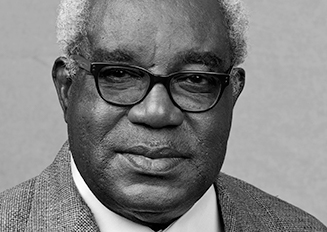
Julius Chambers was the third Director-Counsel of the NAACP Legal Defense and Educational Fund, Inc., serving from 1984-1993. One of this country’s great civil rights lawyers and leaders, he devoted his entire adult life to civil rights law. He died in 2013.
His dedication to equality and justice was shaped by his formative experiences as a boy in segregated North Carolina, in particular by the experiences of his father with discrimination. He was a brilliant law student at the University of North Carolina School of Law where his reputation first caught the attention of then-LDF Director-Counsel, Thurgood Marshall. He graduated first in his class from UNC School of Law, and was the first African-American editor-in-chief of the law review. While teaching at Columbia Law School, he obtained a Master of Laws degree.
Chambers was one of the first two LDF scholarship recipients. The other was Marian Wright Edelman, now President of the Children’s Defense Fund. He also was LDF’s first Legal Fellow. This began his lifelong association with LDF, where he worked as an intern and lawyer, cooperating attorney, board member and board chair, and, finally, as Director-Counsel, a position he held from 1984-1993.
In 1993, Chambers left LDF to become Chancellor at North Carolina Central University, his college alma mater. He remained chancellor at North Carolina Central until he retired in 2001, when he rejoined the firm of Ferguson, Stein & Chambers.
Chambers was a founding member of Ferguson, Stein & Chambers, the first integrated law firm in North Carolina. The firm became a model for civil rights law firm practice in the private bar. Over his years in practice at the firm, and later at LDF, Chambers litigated and argued landmark civil rights cases in the United States Supreme Court, including Swann v. Charlotte-Mecklenberg Board of Education, 402 U.S. 1 (1971) (school desegregation), Thornburg v. Gingles , 478 U.S. 30 (1986) (voting rights), Griggs v. Duke Power Co., 401 U.S. 424 (1971) and Ablemarle Paper Co. v. Moody, 422 U.S. 405 (1975) (employment discrimination), Shaw v. Hunt, 517 U.S. 899 (1996) (redistricting), among many others.
Chambers was known for his sharp mind, his relentless focus on the law as a means of advancing civil rights, his understated sense of humor, and his unflappable demeanor. He was a man of tremendous courage. His home and his car were firebombed on separate occasions in 1965, and his office was burned to the ground in 1971, during the height of some of his most contentious civil rights litigation in North Carolina. When he spoke of these events, Chambers was typically matter-of-fact, insisting always that you “just keep fighting.”
Chambers worked alongside other great litigators and racial justice advocates — Thurgood Marshall, Jack Greenberg, Constance Baker Motley, Robert Carter — and he formed the connective tissue with the next generation of civil rights lawyers — many of whom he personally hired at LDF.
Read more about Chambers’ extraordinary life:
